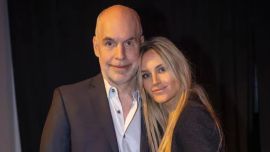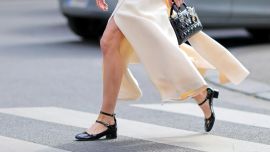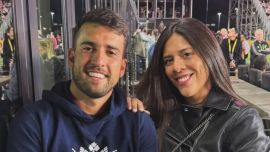As representatives of the Jewish community spoke from the stage, set up outside the site of the 1994 AMIA centre bombing, and photographers fixed their cameras on top government officials, thousands of people listened from the street.
The mass of humans stretched from directly in front of the stage on Viamonte Street all the way past Lavalle, two blocks south.
It hadn't been easy to get through. There was only on entrance, at the intersection of Pasteur and Lavelle, where security guards in suits made people line up in single-file lines. One-by-one, people approached and they’re bags were searched, security officials conducted brief 20-second interviews with everyone who entered.
“Good morning sir/maam,” they would say. “Why did you come to the commemoration today? What is your connection to the Jewish community? Where are you from?”
Among the crowd, security guards wandered around, asking people who had put bags on the ground to hold them in their hands. The most conspicuous were the federal police, who stood by or on armoured trucks nearly the size of tanks.
Inside the cordon, many held up signs with the faces of the victims of the attack. Others held placards demanding an end to impunity – “Slow justice is not justice,” read one, “25 years and we are still counting,” read another.
Many yarmulkes (Jewish male head coverings), Hasidic black hats and traditional female head coverings could be spotted in the crowd.
There was a clear age divide among most of the attendees. While many in the crowd remembered clearly where they were the day of the attack, almost as many had not yet been born or were too young to remember.
At one point, a video played on a screen that underlined how long had passed since that attack, featuring interviews with people who were born July 18, 1994. Today, they are now fully grown adults.
But regardless of age, sex or religion, they were all there for one purpose: to preserve the memories of the victims, and renew the demand for justice.
As the siren sounded at 9.53am – the exact time the attack, a quarter of a century ago – there was complete silence.
Experiences
Horacio was ten blocks away on July 18, 1994. He still felt the explosion when the bomb went off. “Everything shook,” he recalled.
Middle-aged, he proudly donned an Israeli Defence Forces T-shirt to the commemoration. He is mostly secular, but he took out a yarmulke from his pocket when the siren was sounded.
Ignacio, an older man with a wrinkled face, white hair and a black felt yarmulke – a variety usually worn by more orthodox Jews – also felt the explosion from a distance away.
“I was working in my office and I felt the explosion 10 or 12 blocks away from here,” he recalled. “I come to every anniversary because you have to keep the memory alive and continue demanding that there be justice.”
Few survivors, however, felt the explosion more strongly than Daniela, who lived on the same block as the community centre. She nearly lost her life that day in 1994.
"I lived here. I am a survivor,” she said.
“I was going to go somewhere at the time of the attack but for some reason I was delayed leaving my house and for that reason I am still alive today. So I always come to these commemorations,” she told the Times.
She initially did not realise what had happened.
“When the bomb exploded, I did not know what it was. I thought it was a crash or a gas explosion or something like that. Then I left the house with my family and saw everything that had happened.”
Due to her proximity to the building, she had many neighbours who were victims of the attack.
“I was 21 in 1994,” she said. “And thankfully I did not die then and I went on to get married and have children.”
Frustration – and disagreement
One theme dominated the event: the fact that the perpetrators of the attack have not been brought to justice. The message “85 lives uprooted. 25 years of impunity,” was displayed on screen before the start of the ceremony.
Horacio could not help but vent his frustration about the failure, which he directed towards the “political class” from all parties.
“There is still no justice,” he lamented. “They are all corrupt. All of them, all of them. The ones we had before, the ones we have now.”
After asking where I was from, he inquired: “Do you think it would take the United States 25 years to declare Hezbollah a terrorist organisation?”
Security Minister Patricia Bullrich announced two weeks ago that the government would move to officially designate Hezbollah a terrorist organisation.
“This is why we are a third world country. This is why we are the country that we are. This is the justice system that we have and the political class that we have,” Horacio lamented. “Governments come and go, but nothing ever changes.”
Ignacio was more sympathetic to President Mauricio Macri’s government than previous administrations, lauding it for their decision on Hezbollah.
“It’s very important, very important. Because the previous government, unfortunately, signed a treaty in which they lifted the red alerts on all of the suspected terrorists and their collaborators,” he said, referring to Cristina Fernández de Kirchner’s administration.
“This government, out of all the governments who have governed since 1994 until now has been the most effective because first of all they annulled the Memorandum of Understanding with Iran and now they are declaring Hezbollah a terrorist organisation,” he said.
“But unfortunately after 25 years, the evidence is diluted,” he sighed.
During the final speech of the event, Sofía Gutman, the mother of one of the victims chastised former president Cristina Fernández de Kirchner by name and described the 2013 Memorandum with Iran as a “betrayal” of the attack’s victims and their families.
Daniela, though she appreciated the impassioned demands for justice, said did not agree with Gutman’s decision. It was still not confirmed whether Cristina had a role in covering up Iran’s alleged involvement in that attack or Alberto Nisman’s mysterious death, she explained.
“I can’t actually confirm that Cristina was directly involved. So in that sense I did not agree,” she explained. “I know those people have a reason to say what they say and to think what they think.”
Rabbi Zalmi, a Buenos Aires rabbi in the Hasidic sect known “Chabad” was five years old in 1994. This year he stayed after the ceremony to assist Jews who wanted to put on “tefillin” – a set of small black leather boxes containing scrolls of parchment inscribed with verses from the Torah that observant Jews put on every day. Or, as Zalmi calls them, “God’s wi-fi.”
Speaking in English about the mention of Fernández de Kirchner in the speech, he said he was not a “very political” person.
“I cannot tell you if it was correct or not correct,” he said. “I am sure each side has their reasons.”
Community
A common sentiment expressed by attendees was that the AMIA bombing was not only an attack on the Jewish community.
After a TV reporter reporting before the event said, speaking to camera, that it was an attack against the Jewish community, a man from the crowd told her he had a correction. He explained to her, off-camera, that it was not just an attack against the Jewish community but against all of Argentina.
“It wasn’t an attack against the Jewish community,” Ignacio insisted, agreeing with the man. “It was an attack on the country, the national security of the country.”
For Rabbi Zalmi, it is not only Jews who have a responsibility to come to the commemoration.
“It is important to be here,” he said. “Every citizen in Buenos Aires has to be here to represent that we support this cause and that we’re looking for justice and that every person that was behind this should get what they deserve.”
According to him, it’s both a moral responsibility as humans and a civic duty as Argentines.
“Every member of the civilisation has to realise that you cannot only fight evil only through the courts. It’s done by each one of us adding light in their private lives. Jews in their own way, non-Jews in different ways but that is the responsibility everyone has. We are not private citizens, we are public citizens,” he declared.
“We all have a responsibility to bring light to the world.”





















Comments